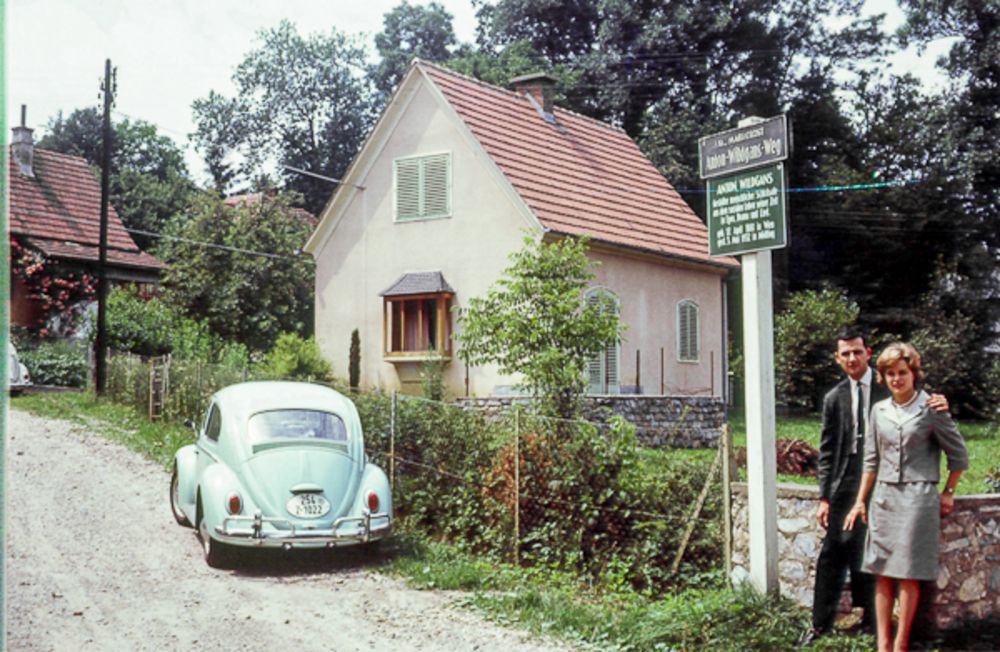My "Fulbright Story" differs in many respects from those of other past Fulbrighters. In other ways it was exactly the same in having a major impact on my career as a historian, and creating or deepening life-long friendships. Not incidentally, it also included what amounted to a seven-month honeymoon! To begin with, my Fulbright year in Austria, 1963-64, was actually my third trip to Austria. I had visited the country briefly in 1954 while traveling with my parents. Our visit was only a week or ten days long and was confined to Bregenz, Innsbruck, and Salzburg. This initial exposure to Austria came at the end of a three-month trip to Europe half of which had been in Switzerland where my father's stomach problems were greatly eased by our restful stay in a chalet overlooking the Lake of Lucerne.
This first trip to Europe aroused my enthusiasm for travel, in general, and Europe and European history, in particular. As a consequence, when as a sophomore at Grinnell College (Iowa) I learned about the Institute of European Studies--now called the "Institute for International Education of Students"--I jumped at the opportunity to spend my junior year in Vienna. I was extremely fortunate in having an Austrian room-mate who became a life-long friend, Walter Siegl (who later rose to the top of the Austrian Foreign Service) thus enabling me to avoid the risk of remaining in an American cocoon. Our daily conversations and my visit to his home in Vorarlberg at Christmas enabled me to vastly improve my German. By the end of the year, I had seen Stalinist Prague and much of Europe west of the Iron Curtain, and was determined to specialize in Austrian history.
Five years later, in 1963, having graduated from Grinnell, completed an M.A. at the University of Nebraska, and studied for two years at the University of Rochester (NY), I was eager to return to Austria. My mentor, Arthur J. May, at the time the foremost scholar of Austrian history in the U.S., said I would improve my chances for an award if I told the Fulbright Commission that I wanted to do doctoral research in Graz, a city virtually unknown to most Americans including, I am sure, many Fulbright applicants. Professor May's advice proved to be sage.
The third unusual aspect to my Fulbright year was that I returned briefly to Rochester to get married in late December. The unusual timing enabled me to spend three months in the fall living with the wonderful family Moosbreuggers, the children of which I maintain contact with to the present day. In contrast to my year in Vienna, when I lived in an unheated room, I had a well-heated room with an extra long bed (necessary for my 6'1" frame), a desk, and a sink with hot running water. For three months I spoke and read only German, improving my linguistic skills to the point where only rarely did I need a dictionary. After our wedding my wife and I were able to rent a small but cozy house just a block away from my Fulbright "family." With our new Volkswagen Beetle we were able to explore all of eastern Austria. During spring vacation we drove through Yugoslavia, Greece, Turkey, Bulgaria, Romania, and Hungary. At the end of the academic year we explored Czechoslovakia, Germany, and France. These and later travels proved to be enormously enriching in my teaching.
In the meantime, with the help of my wife in note taking and the comments of another life-long Austrian friend, Helmut Sohmen, I was able to complete my research on an aspect of Austrian fascism which was later published under the title of "Hahenschwanz und Hakenkreuz: Steirischer Heimatschutz und oesterreichischer Nationalsozialismus,1918-1934." It turned out to be the first of six books, most of which were on Austrian history, especially Nazism and anti-Semitism. These books, along with one on totalitarianism, enabled me to win Austria's highest prize for scholarship in 2010, the Ehrenkreuz erste Klasse fuer Wissenschaft und Kunst, which was presented to me by the Austrian ambassador to the United States, Christian Prosl. Being an "outsider" enabled me to examine highly controversial aspects of Austrian history from a non-partisan point of view, which I believe added substantially to my credibility.
My Fulbright year proved to be one of the highlights in my autobiography, "Pioneering History on Two Continents." The year, although just one of nineteen research and study trips to Austria, and twenty-five to Europe as a whole, was the most memorable and rewarding, one both for my forty-two-year career as a professor, and for my marriage!
Bruce Pauley was a US Fulbright Student to the University of Graz in history in 1964–65 and is a professor emeritus at the University of Central Florida.
